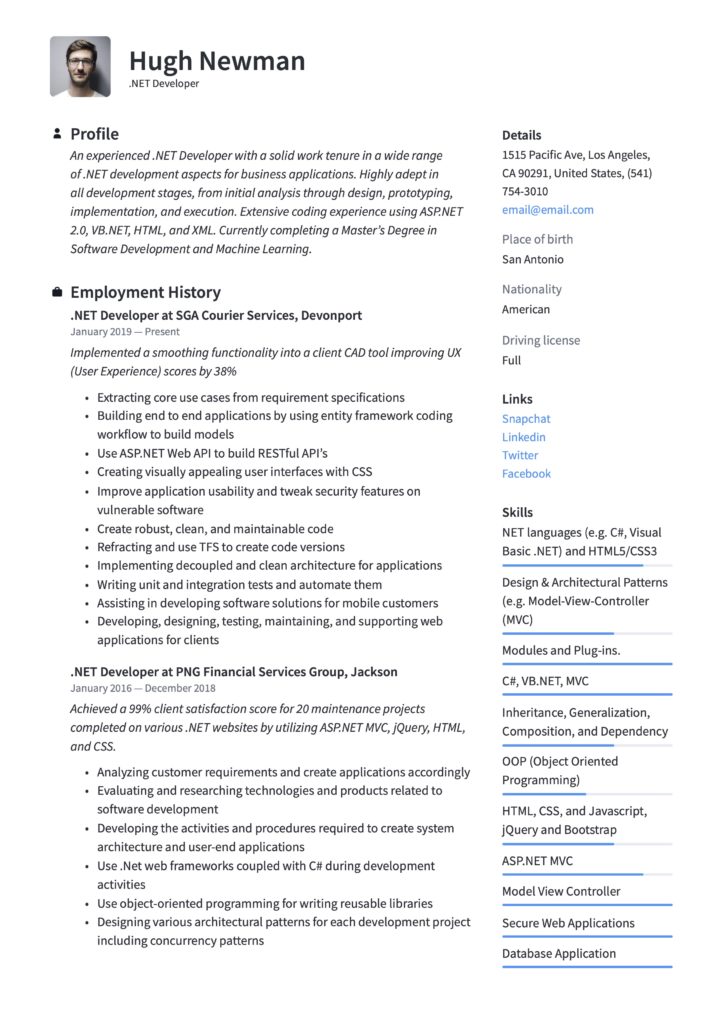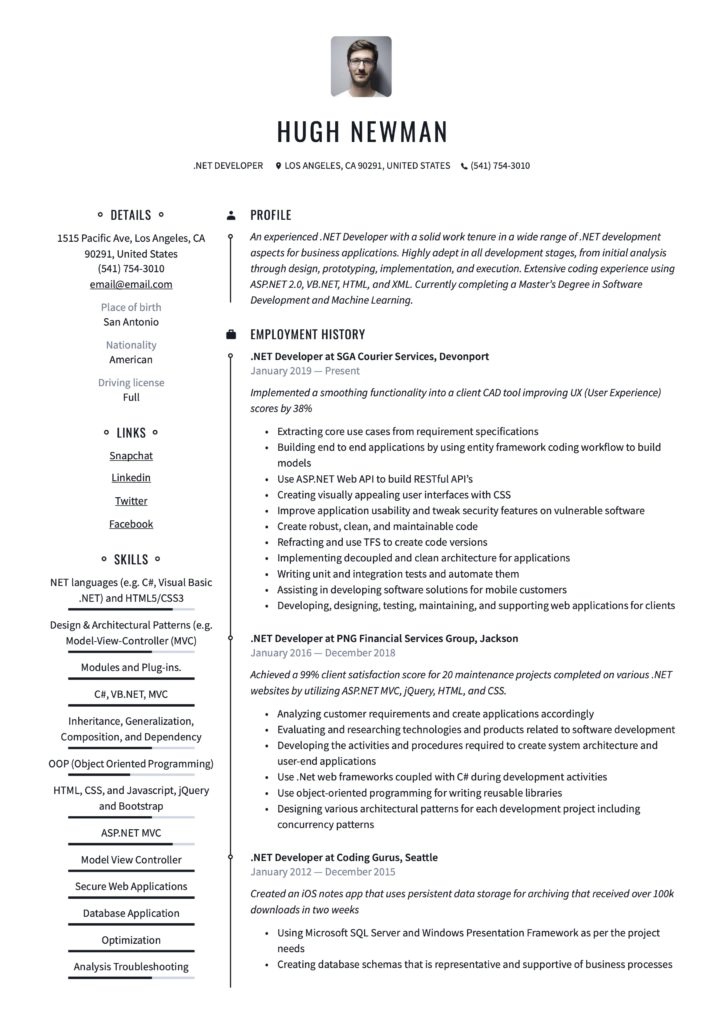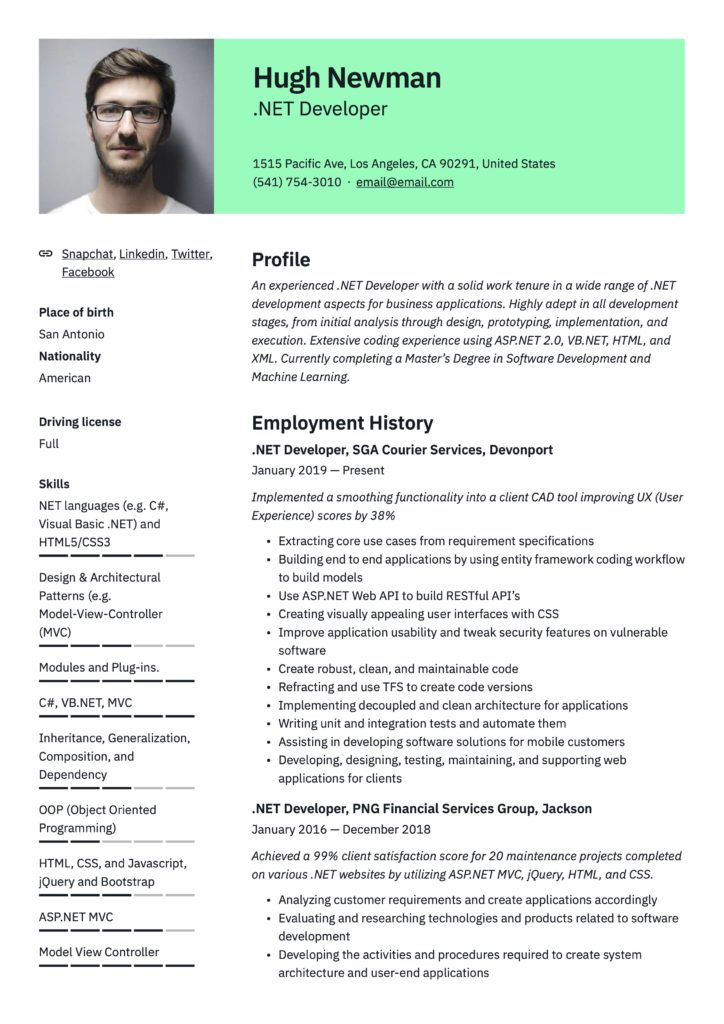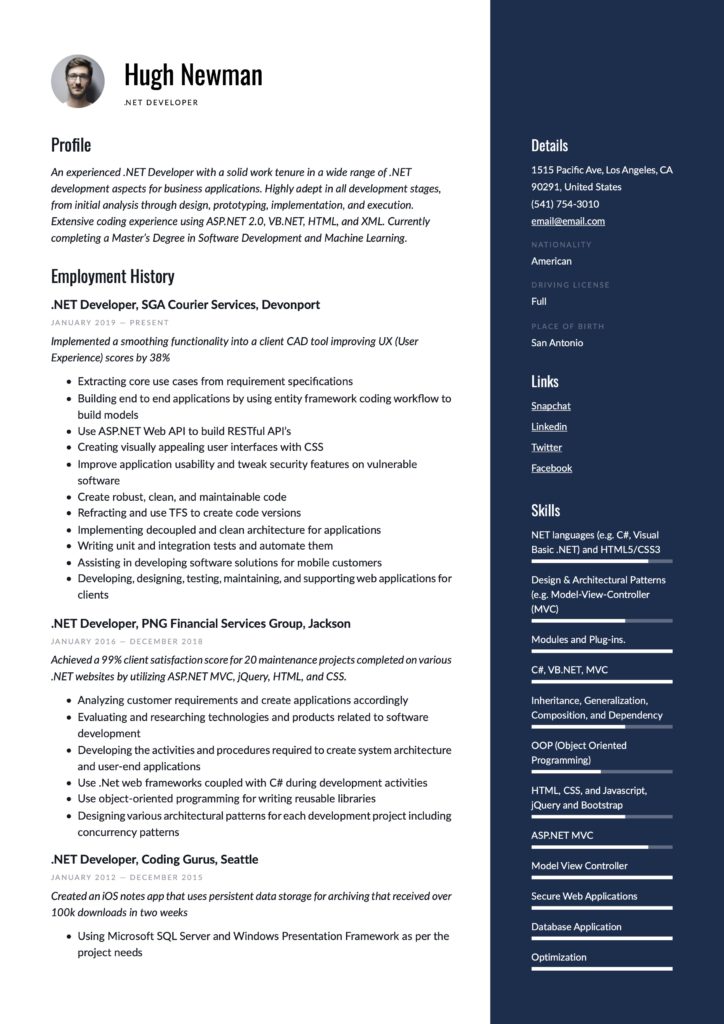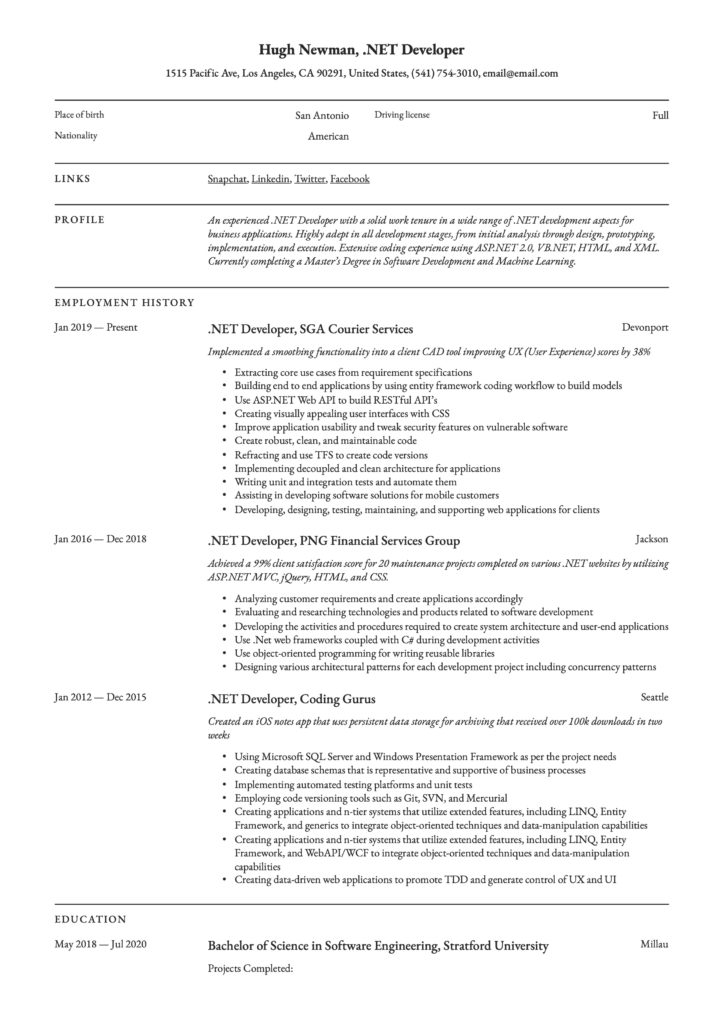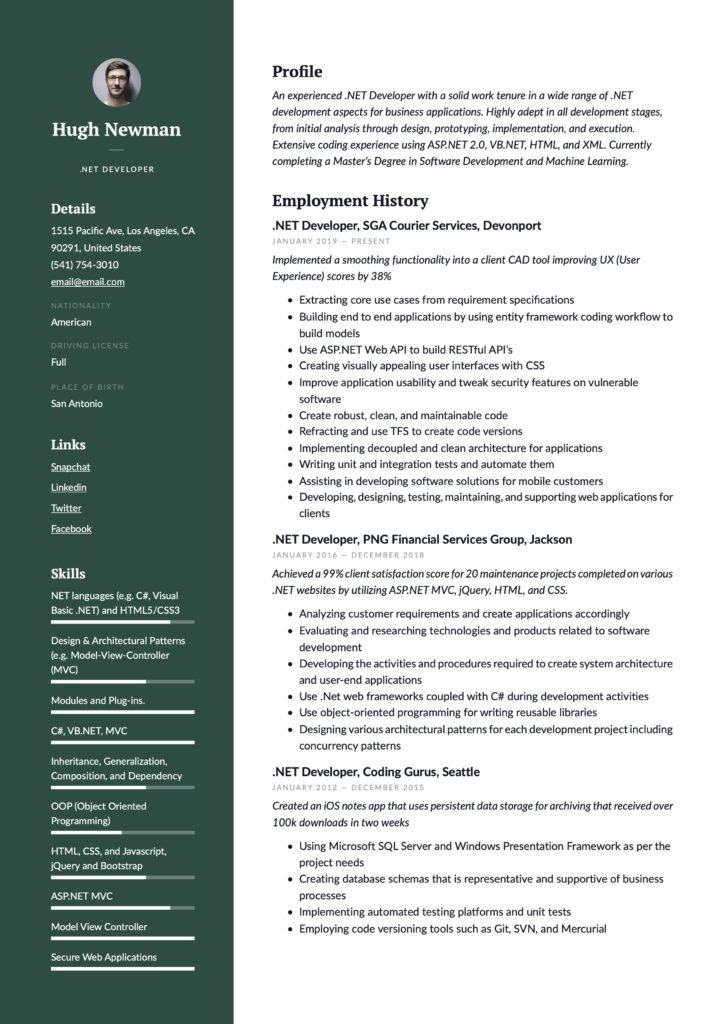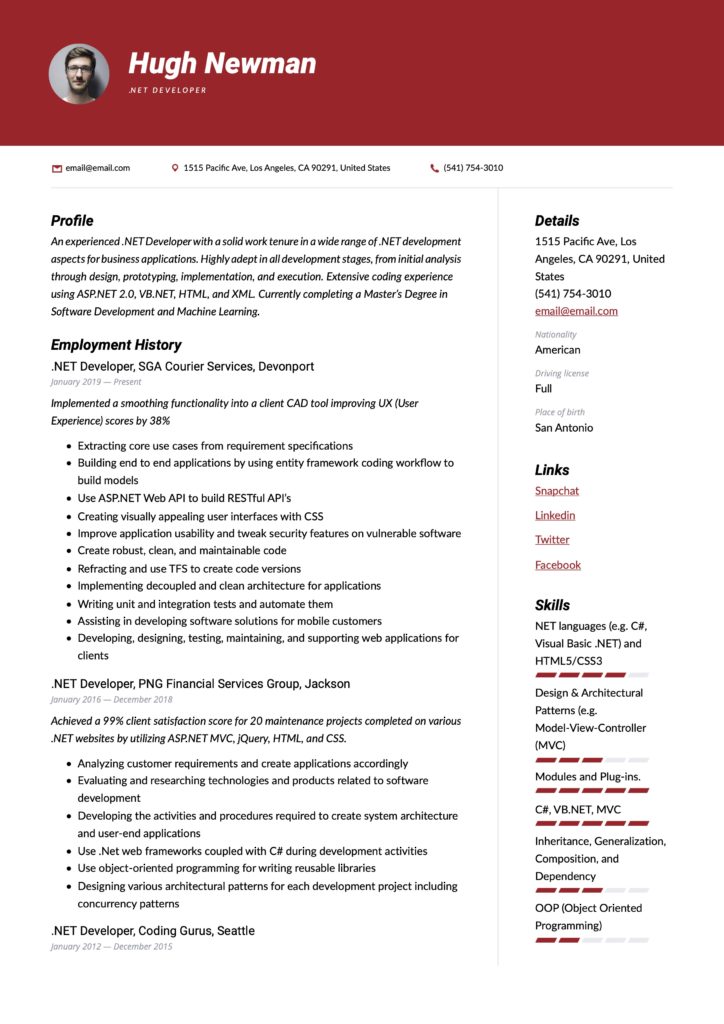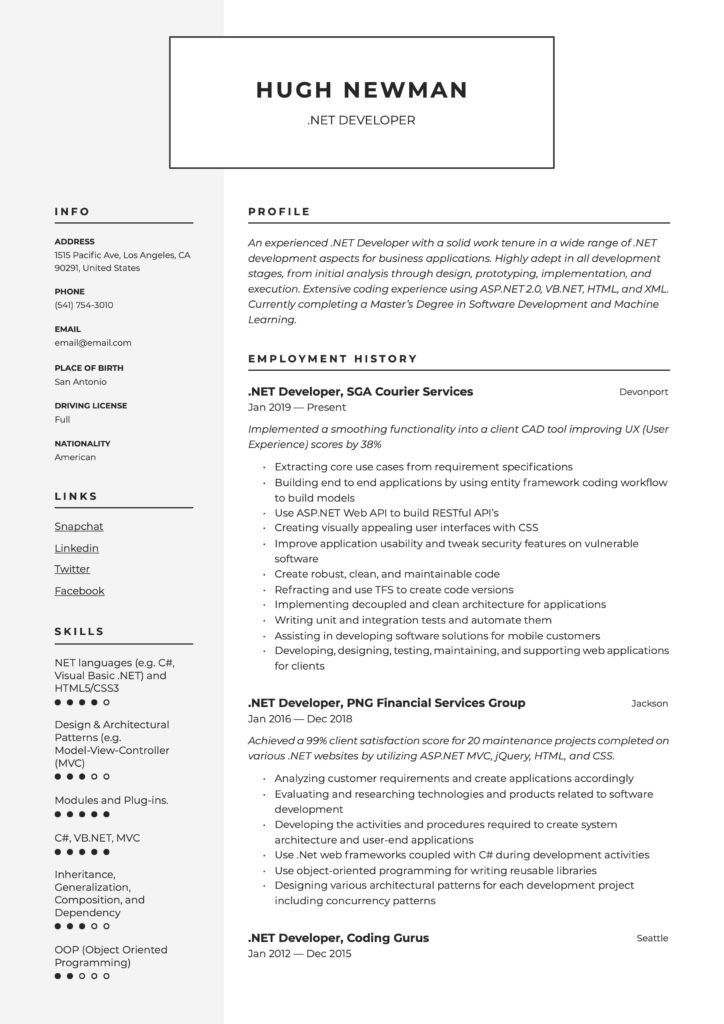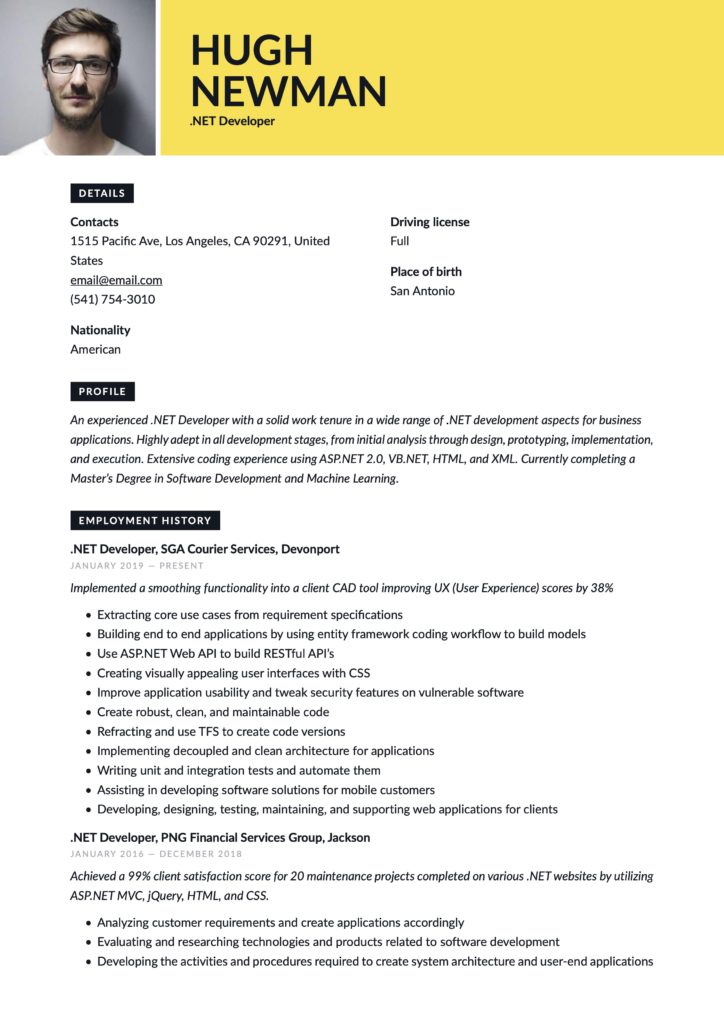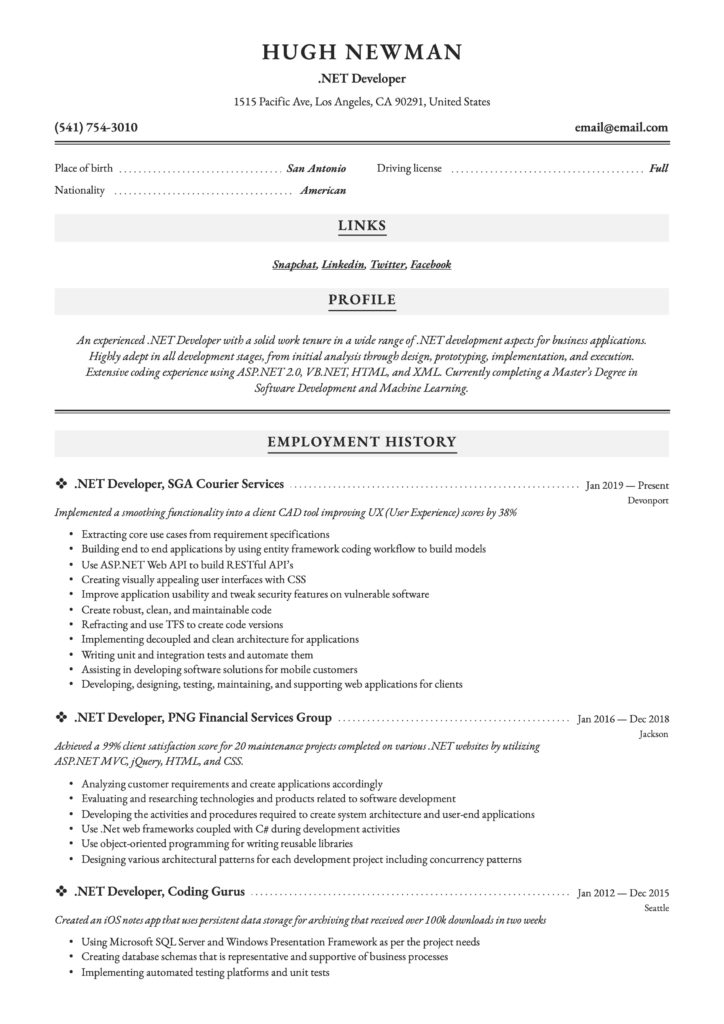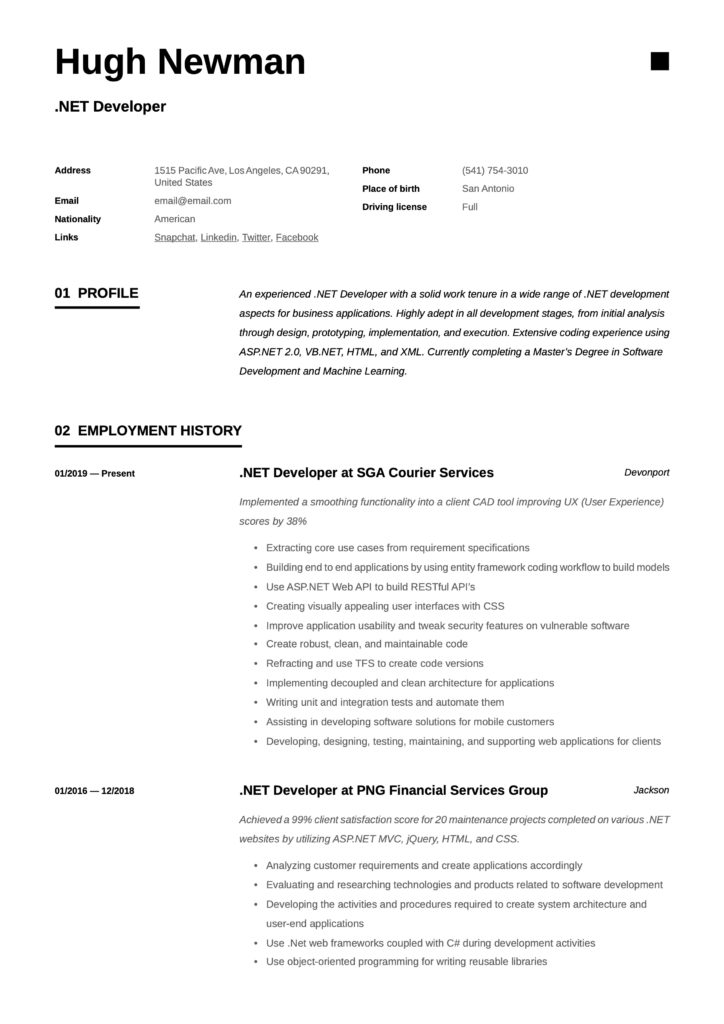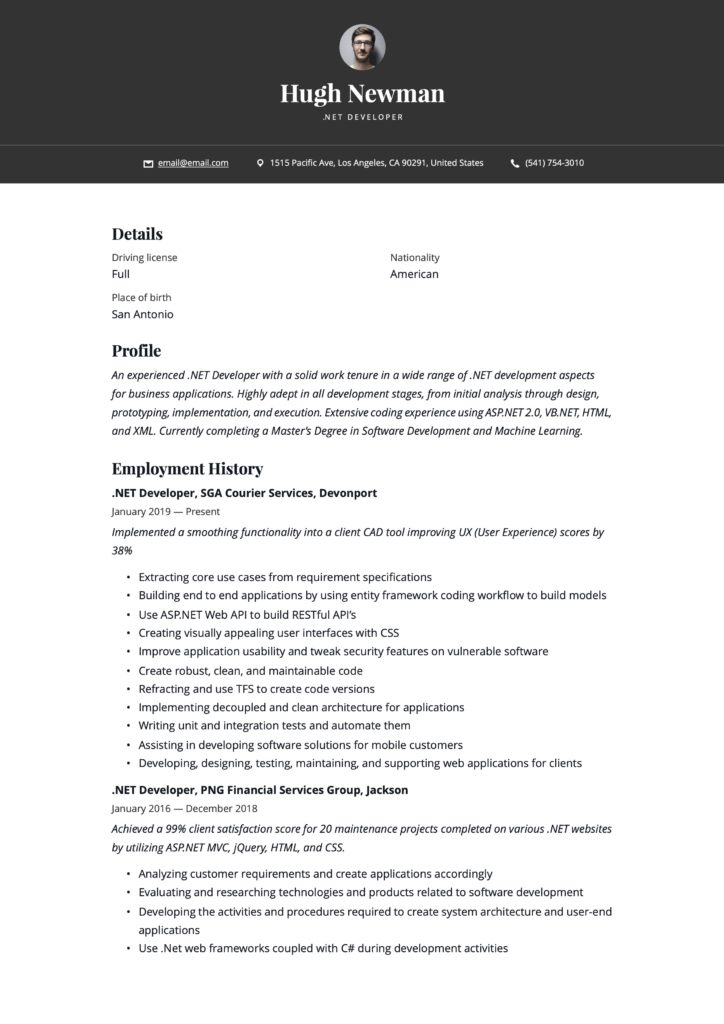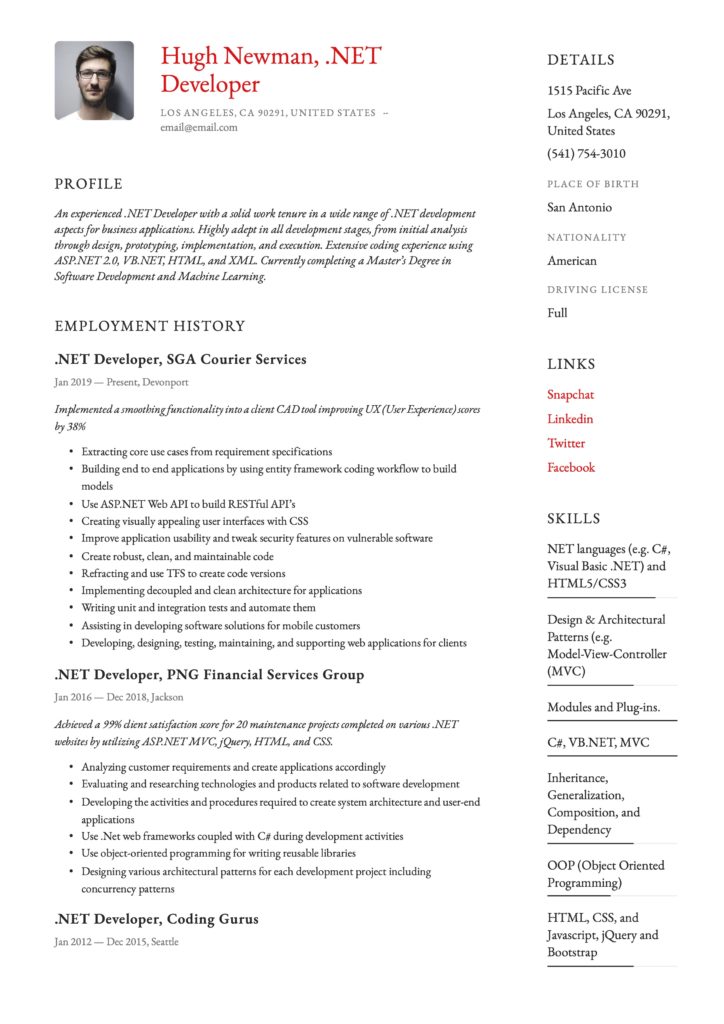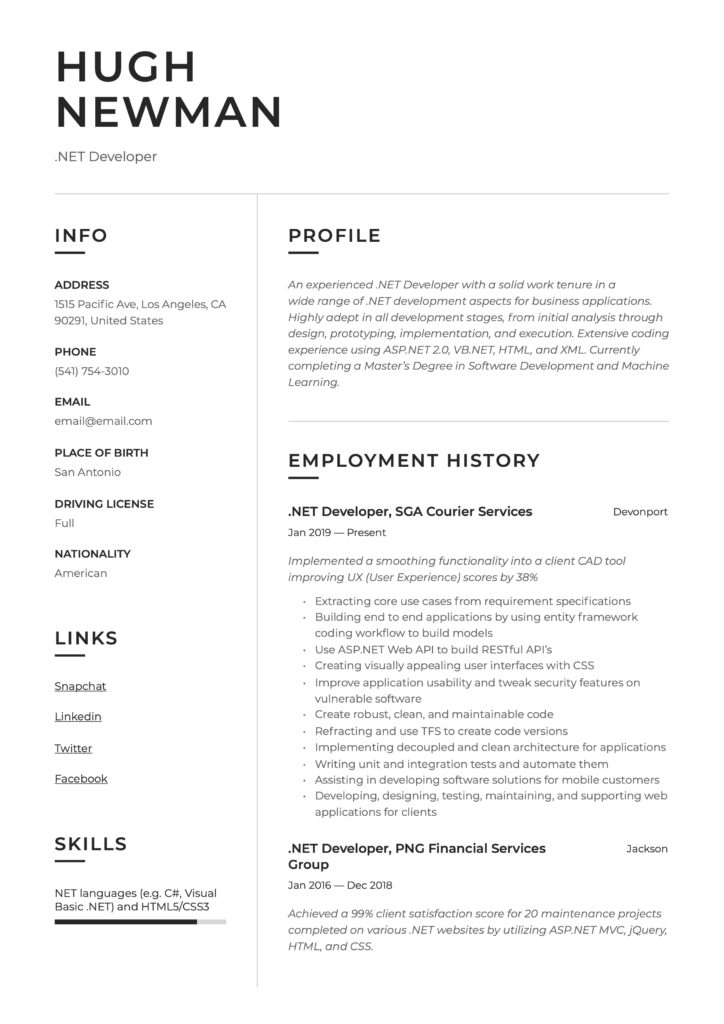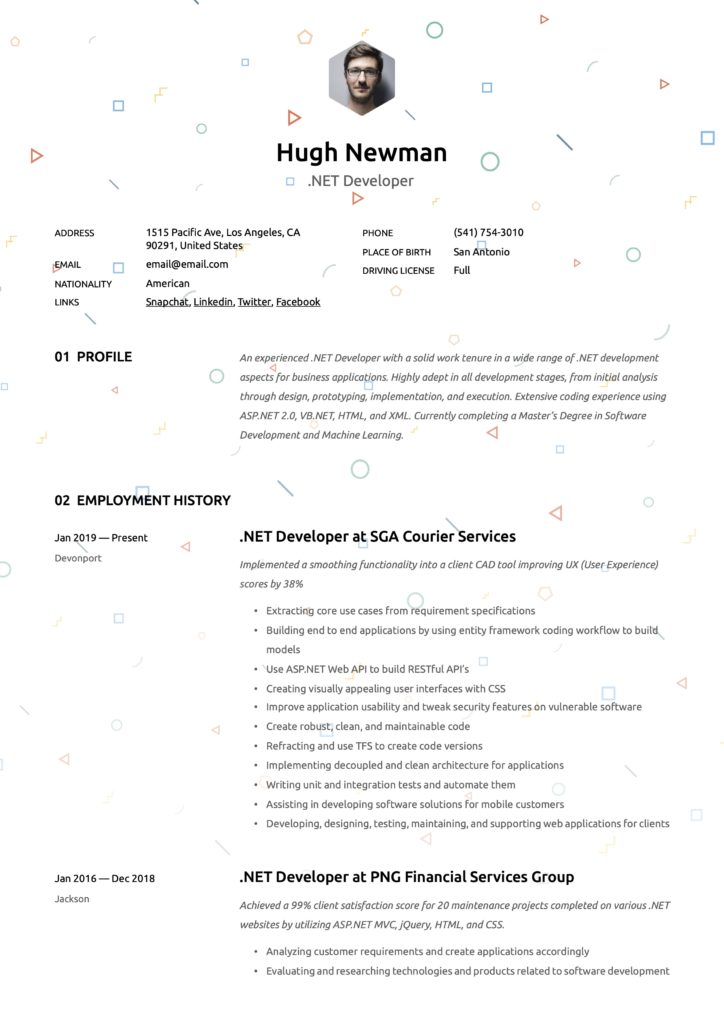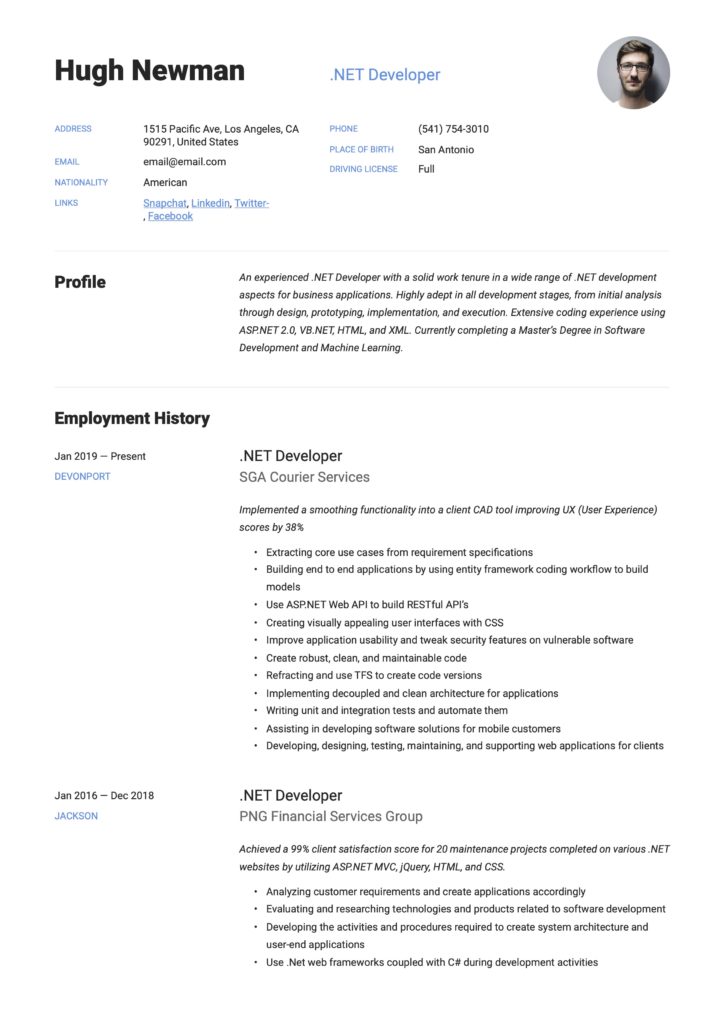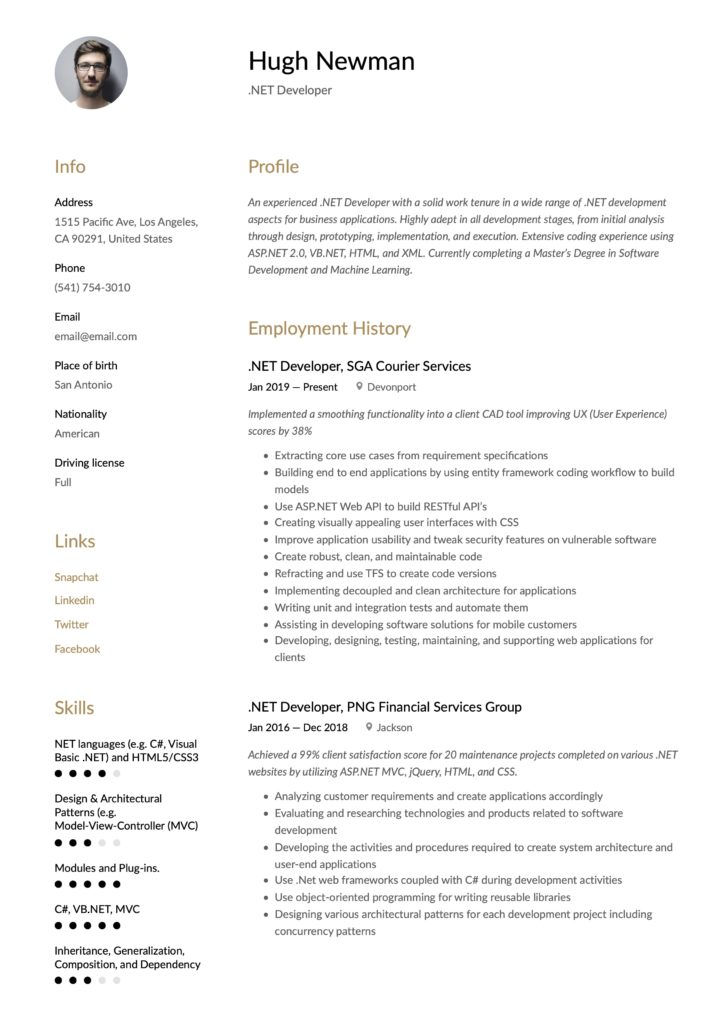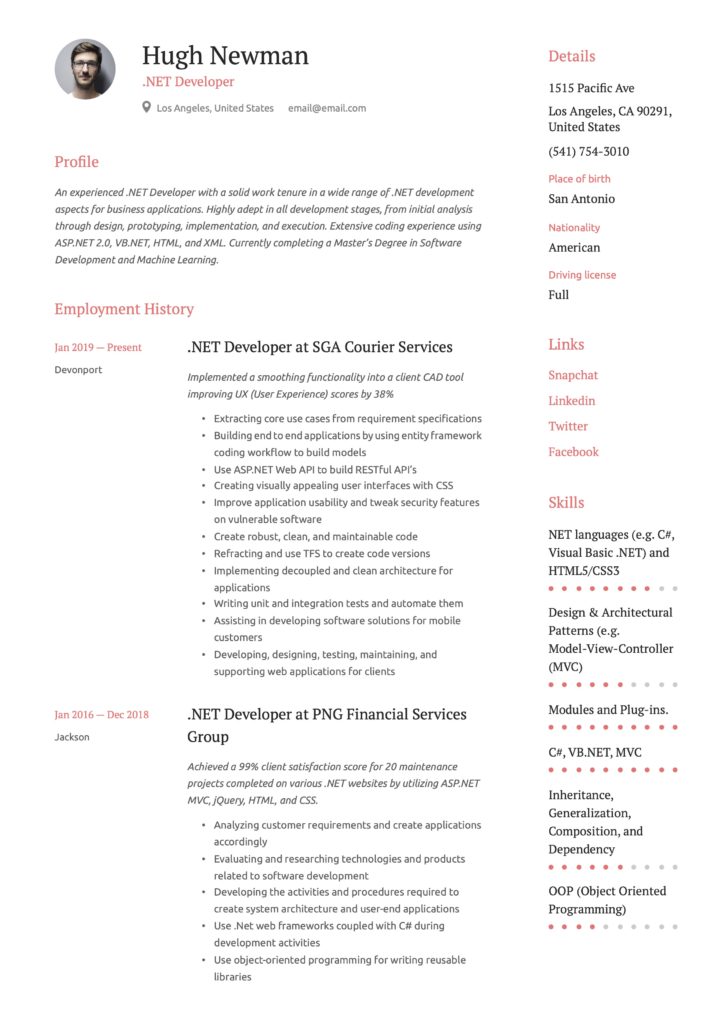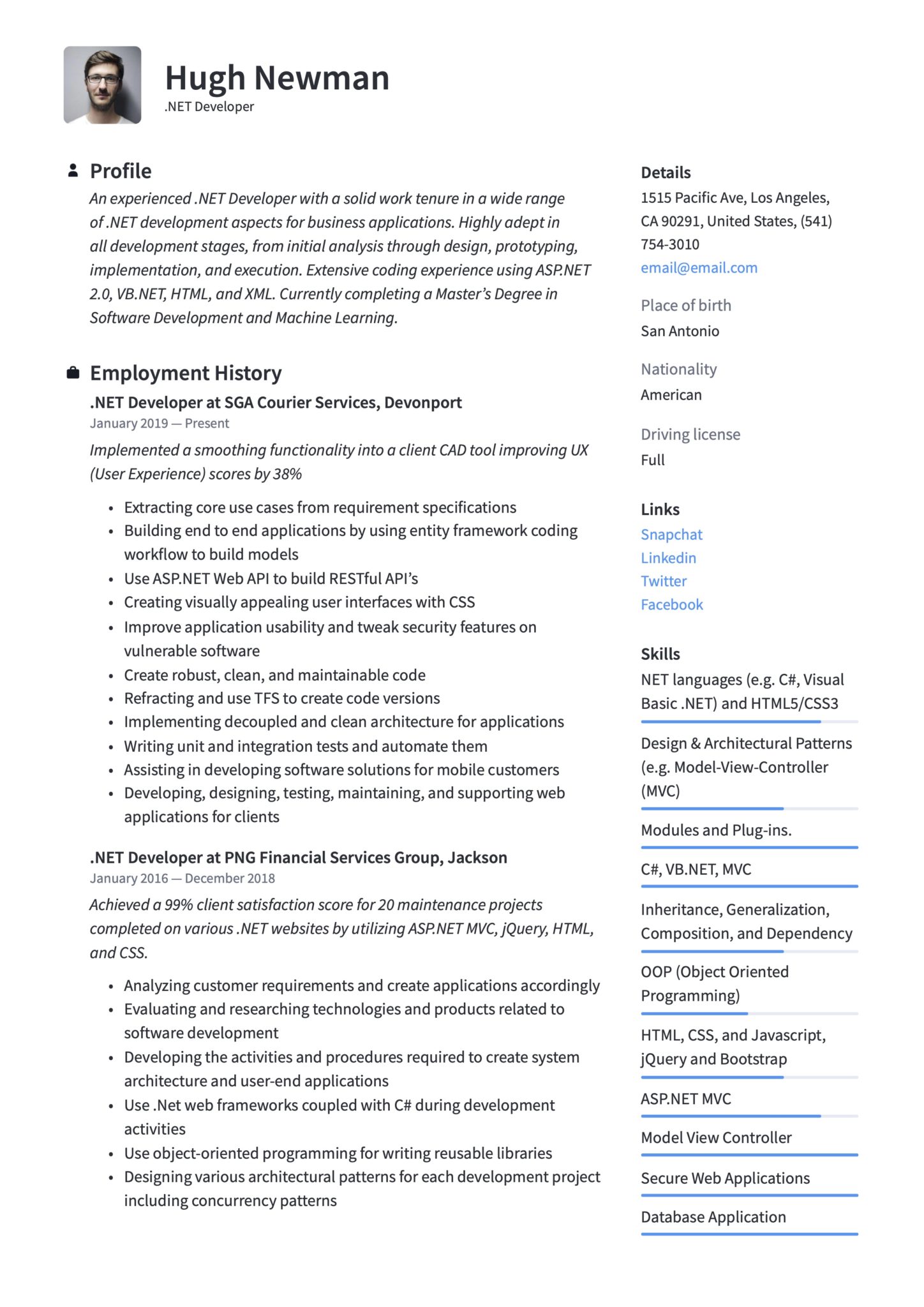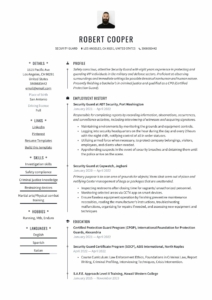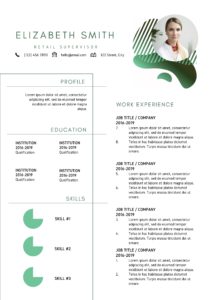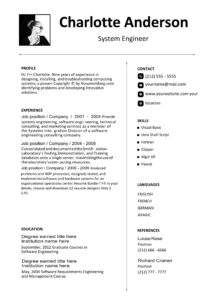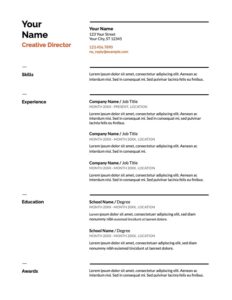When you are on the hunt for a new .NET Developer role, it is essential first to check out a top-notch .NET Developer resume sample. The primary function of .Net Developers is to design web applications for business systems. This is a highly competitive field and to stand out from the crowd, you need to show more on your resume than merely the assumed coding, programming, and integration
How you create a resume into an interview-winning document, we will explain to you in detail below with our: How to Make a Resume Guideline for .NET Developer Roles?
What you can read in this article
.NET Developer Resume Sample
(Free sample downloads are at the bottom of this page)
.NET Developer Resume Writing Guide
Resume Sections
1. Contact Information:
- Name
- Address
- Phone number
- Email (a professional one)
Be sure to include alternative contact channels like your LinkedIn profile or Facebook URL details. Double-check the digits of your phone number before submitting your application.
2. Career Summary:
View this as the introduction to your resume and include 1-3 sentences giving a broad overview of your background, years of industry experience, special skills, and highest qualifications. Add a wow factor or two where you have made a particularly significant contribution at your employer, for maximum impact.
3. Qualifications Summary:
Provide accurate details about the formal qualifications or certifications you have completed with the institution, qualification name, and dates. Also include information regarding current academic pursuits and indicate an estimated date of completion. .Net Developers usually hold Bachelors Degrees as a minimum in disciplines such as Computer Sciences, Software Engineering, Information Technology, Cybernetics, or Mathematics. However, this industry evolves at such a rapid speed that companies often want candidates with PhDs or Masters Degrees. Professional certifications in C# and other coding languages are must-haves, and any other credentials you hold in the fields of software or database development would be to your advantage.
4. Relevant .Net Developer Experience:
A minimum of three years of demonstrable work experience is a minimum requirement to land a .Net Developer role. Further to that, you need to highlight expertise in troubleshooting along with ASP.NET framework, SQL Server, applications development, and design of architectural patterns (styles and API’s) with a solid understanding of Agile Methodologies. Use the job spec as a guideline to decide which tasks you should include under each employment experience held. A reverse chronological order or function format resume is relevant to a .Net Developer application.
5. Other Employment Experience:
This will include projects or work history outside of your formal .NET Developer jobs, perhaps volunteering as a web designer or doing coding jobs on the side while studying. If you have participated in any open source projects, be sure to list those gigs, too, as they serve as further proof of your knowledge and understanding around .Net technology fundamentals.
6. Skills Summary/Key Skills:
This is perhaps the most important section on your .Net Developer resume and provided credibility regarding your work tenure and competencies. Add a practical element to your skills section by grading your skills in terms of practical experience ether in years or according to expert levels. You may do this utilizing a skills matrix incorporating keywords from the job posting and your specific skill set. Add core competencies and mention the various software and platforms that you are familiar with by name.
What to Highlight in a .NET Developer Resume
Regardless of your career tenure, your .NET Developer resume should include certain vital elements that employers and recruiters would look for when making their shortlisting decisions.
.NET is a Microsoft framework and the top solution for cloud and local servers of Windows, but you need to be more specific about the exact .Net language(s) you have expertise in. For example, mention whether you are tenured in VB.NET, C#, or F#. You also need to highlight which .NET stack(s) you can work with, such as WPF, Silverlight, WinForms, or ASP.NET.
Next up, give detail about your daily tasks, for example, the type of application programs you develop, specify product lines, frameworks, and tools for better clarity. Remember, the recruiter or HR Manager reviewing your resume is not a technical professional, and they would be doing keyword searches to select relevant applicants.
Another point to discuss is the industry that you are working in. .Net Developers are mainly employed in systems consultancies and software companies, but you could also be working for telecoms, information technology, engineering, or computer services providers. Some .Net developers are also employed by research and development facilities or in the IT departments of financial services or healthcare organizations. Certain .Net Developers are employed in specialist fields such as online or e-commerce, where companies use their services to expand online offerings by offering mobile applications for their clients. Use the SIC codes on the BLS site to categorize your industry experience appropriately.
The role of a .Net developer is jam-packed with multiple deadlines as you would often be working on numerous projects simultaneously. Therefore, excellent time management skills are a must-have. You may prove this by indicating the projects that you are currently working one and whether you are ahead on delivery dates.
Any system out there has flaws and bugs at some stage of the development life cycle, and therefore debugging is an essential aspect of a .NET Developer’s role. Explain to the reader of your resume how you would inspect code for errors and also repair methods such as patches used to fix problematic issues..Net Developers should be avid coders with excellent attention to detail for spotting errors and technical gremlins.
Now it’s time to get into the nitty-gritty of specific tasks assigned to you as a .Net Developer. In the section below, we have summarized them for you:
- Develop Web-Based Applications:
Indicate to hiring managers how much of your time is spent developing brand new applications for different types of business including the sub-tasks of coding, testing, and debugging of these applications.
- Document Application Codes:
Recruiters need to see information about your capability of creating accurate documentation detailing the code strings utilized in new applications. You may want to provide information regarding databases, software development processes, and operational procedures that you follow to create record document application codes.
- Assess and Upgrade Existing Applications:
A .NET Developer is also responsible for evaluating existing applications and come up with new solutions to improve them via modifications or upgrades.
- Provide Support for Web Applications:
.Net Developers work with testers, software developers, and other project team members to maintain and tweak applications. Explain to hiring managers how you go about fixing coding issues and the level of technical support you provide to the team.
*Cool Tip for Software skills include: Net Developers need technical expertise in a wide range of apps and tools. Make an impact by summarizing your professional competencies by Database, Software, and Languages per every project. You can include them in a Developer Stack table such as the one below:
| IoC Containers | Castle Windsor Container, Unity, Structure Map, Ninject, AutoFac |
| Communication frameworks | WCF, ASP.NET Web API, 1-2, Web Services |
| Desktop frameworks | WPF, Windows Forms |
| Web frameworks | ASP.NET MVC 1-5, ASP.NET Web API 1-2, ASP.NET Web Forms |
| ORM | Entity Framework 1-6, nHibernate 1-5, Linq2SQL (depreciated), ADO.NET |
| C# unit testing frameworks | nUnit, SpecFlow, MSTest, xUnit |
| C# build tools | TFS, Team City, Jenkins, Cruise Control .NET, Azure DevOps |
| Languages | C#, Visual Basic .NET, F#, C++ .NET |
| Client-side technologies | HTML, CSS, JavaScript |
| .NET Framework versions | .NET 1.0 – .NET 4.7.2 |
.NET Developer Profile Summary
Hiring managers typically have hundreds of resumes to go through and very little time to read them all in detail. Keep your resume summary concise and to the point. Place the most relevant information in the first sentence of your career synopsis first to capture their attention immediately. Your profile summary aims to emphasize your most robust qualifications. It also shows how to highlight the capabilities and traits that make you an exceptional .NET Developer and, more importantly, an asset to a company that’s hiring.
When deciding what information to add, use the job description as your guide. For instance, if the job you are applying to emphasizes expertise in designing code or architecture development, use the same verbiage in your summary. The more your resume resonates with the job description of keywords, the better fit you will seem.
Add a sentence that showcases outstanding qualities that will add value to the company. Finally, finish off with your educational degrees/diplomas, and any certifications/licenses you may have that are pertinent to the job.
Examples of .NET Developer Profile summaries:
Junior Profile Summary 1
“Junior .NET Developer with solid aptitude in using applications like Microsoft, HTML5, CSS, JavaScript, and TypeScript, for mobile-responsive design, and systems networking. Runs a website building company as a side to help businesses achieve their marketing goals. Recently completed a Bachelor of Sciences in Computer Engineering with MIT.“
Experienced Profile Summary 2
“An experienced .NET Developer with a solid work tenure in a wide range of .NET development aspects for business applications. Highly adept in all development stages, from initial analysis through design, prototyping, implementation, and execution. Extensive coding experience using ASP.NET 2.0, VB.NET, HTML, and XML. Currently completing a Master’s Degree in Software Development and Machine Learning.“
Experienced/Senior Career Summary 3
“Out the box thinking .NET developer with 4+ years of experience in ASP.NET MVC, and client-side web development for e-commerce websites and IOS/Android Mobile Applications. Successfully completed 20+ projects for SQL database design and maintained over 20 .NET websites with a 98% client satisfaction rate.“
.NET Developer Job Descriptions and Responsibilities
An employer would expect to see specific proven foundational duties and skillsets within an applicant’s resume, depending on the educational level and career stage. In the section below, we have listed the most critical .NET Developer duties to help get you started in writing your own job description.
Examples
Job Description for a .NET Developer:
- Extracting core use cases from requirement specifications
- Building end to end applications by using entity framework coding workflow to build models
- Use ASP.NET Web API to build RESTful API’s
- Creating visually appealing user interfaces with CSS
- Improve application usability and tweak security features on vulnerable software
- Create robust, clean, and maintainable code
- Refracting and use TFS to create code versions
- Implementing decoupled and clean architecture for applications
- Writing unit and integration tests and automate them
- Assisting in developing software solutions for mobile customers
- Developing, designing, testing, maintaining, and supporting web applications for clients
- Analyzing customer requirements and create applications accordingly
- Evaluating and researching technologies and products related to software development
- Developing the activities and procedures required to create system architecture and user-end applications
- Use .Net web frameworks coupled with C# during development activities
- Use object-oriented programming for writing reusable libraries
- Designing various architectural patterns for each development project including concurrency patterns
- Using Microsoft SQL Server and Windows Presentation Framework as per the project needs
- Creating database schemas that is representative and supportive of business processes
- Implementing automated testing platforms and unit tests
- Employing code versioning tools such as Git, SVN, and Mercurial
- Creating applications and n-tier systems that utilize extended features, including LINQ, Entity Framework, and generics to integrate object-oriented techniques and data-manipulation capabilities.
- Creating applications and n-tier systems that utilize extended features, including LINQ, Entity Framework, and WebAPI/WCF to integrate object-oriented techniques and data-manipulation capabilities
- Creating data-driven web applications to promote TDD and generate control of UX and UI
Highlight Your Accomplishments
Your goal for writing accomplishment statements is to think about what sets you apart, what you are most proud of, or what you accomplished in your previous roles, and communicate these through action-packed statements that are compelling.
Be sure to write in clear terms…..you translate code every day into readable language, make sure to do the same with your achievements so that non-technical recruiters and hiring managers may understand them too. Flat simple statements are OUT. Quantified, action-driven comments are IN!
When writing your resume, if need to answer questions like, “How much?” or “How many?, How long? By when?, How often?”, It will help if you include those numbers in your achievements. For instance:
- Implemented a smoothing functionality into a client CAD tool improving UX (User Experience) scores by 38%
- Responsible for 12+ SQL database design projects and improved delivery time by 35% in 10 weeks through automation software
- Achieved a 99% client satisfaction score for 20 maintenance projects completed on various .NET websites by utilizing ASP.NET MVC, jQuery, HTML, and CSS
- Created six real-world eCommerce websites for clients with accompanying mobile apps which increased average revenue by 10% in a matter of thirty days
- Created an iOS notes app that uses persistent data storage for archiving that received over 100k downloads in two weeks
.NET Developer Education Section
The education section forms an integral part of your .NET Developer resume. In short, indicate What, Where, and When regarding your qualifications, certifications, or industry licenses obtained. These serve as your record of work and proof of technical competencies.
Also, remember to list the current qualifications you are in the process of completing.
Examples:
2016–2018 Bachelor of Science in Software Engineering, Stratford University, Miami, FL
Projects Completed:
- Overhauled the university’s alumni fundraising site with .NET, which boosted alumni use by 25%
- Tutored ten fellow students in ASP.NET MVC
2016 – Certified JavaScript, HTML5, and Microsoft; Computer Learning Center, Boston, MA
2016 – Certified Specialist in C# Development, Torque IT, Online
2015 – Certified Specialist in Visual Basic Development, Microsoft Academy, Online
2014 – Certified Specialist in ASP.NET MVC Development with Visual Basic, New Horizons Training, Online
.NET Developer Resume Skills
Although the .NET Developer field requires specific technical skills, employers look for other skills, called soft skills. These are the main types of skills that indicate to your fit as a potential employee who will add value, has adequate knowledge, sufficient experience, and will be easy to manage. Incorporate these into your summary, or profile, and your accomplishment statements.
The best way to present your skills is via a Skills Matrix Table. Create one for your hard skills (technical competencies) and include a level of competency in the table. Include a separate skills matrix for soft skills and personality traits.
Technical Skills Matrix
| Competency | Expert Level 1-Novice, 2-Intermediate, 3-Expert |
|---|---|
| .NET languages (e.g. C#, Visual Basic .NET) and HTML5/CSS3 | Level 1 |
| Design & Architectural Patterns (e.g. Model-View-Controller (MVC) | Level 3 |
| Modules and Plug-ins | Level 3 |
| C#, VB.NET, MVC | Level 3 |
| Inheritance, Generalization, Composition, and Dependency | Level 2 |
| OOP (Object Oriented Programming) | Level 1 |
| HTML, CSS, and Javascript, jQuery and Bootstrap | Level 1 |
| ASP.NET MVC | Level 3 |
| Model View Controller | Level 1 |
| Secure Web Applications | Level 2 |
| Database Application | Level 3 |
| Optimization | Level 3 |
| Analysis & Troubleshooting | Level 2 |
| Client-side Web Development Technologies | Level 1 |
| Architecture Styles/APIs (REST, RPC) | Level 3 |
| Agile Methodologies | Level 2 |
| REST and RPC APIs | Level 1 |
| Demoing & Deploying | Level 3 |
| Testing and Debugging | Level 2 |
| Software Design & Version Control | Level 1 |
| Coding (Read, Write, Create) | Level 1 |
| Full-stack Development | Level 3 |
Interpersonal Traits Matrix
| Attention to detail | Facilitation | Flexible |
| Team Player | Organization | Adaptable |
| Written Communication | Time Management | Analytical Thinking |
| Verbal Communication | Prioritization | Initiative |
| Reliable | Meticulous | Dependable |
| Punctual | Sound Judgement | Stress Tolerance |
| Trustworthy | Creative Problem Solving | Persistent |
| Cooperative | Cooperative | Unconventional |
| Task Orientated | Analytical | Independent |
Qualifications/Certifications associated with .NET Developers
| Microsoft Certified Solutions Developer (MCSD) | Certified Expert in Visual Basic Development | Certified Expert in ASP.NET MVC Development with C# |
| MTA – Microsoft Technology Associate | Certified Expert in C# Development | Certified Expert in ASP.NET Web Forms Development with C# |
| ASP.NET MVC | MCSA: Universal Windows Platform | Oracle Certified Professional (OCP) MySQL 5.6 Developer |
| MCSA: Web Applications | MCSA: Universal Windows Platform | Oracle Certified Professional (OCP) MySQL 5.6 Developer |
| Microsoft Certified Architect | Microsoft Certified IT Professional Builder | Scrum Alliance Certified Scrum Developer (CSD) |
Professional information on .NET Developers
Sectors: Various
Career Type: Development, Coding Information Technology, Computer Science, Engineering, Programming, Architecture, Networks
Person type: Writer, Debugger, Coder, Creator, Implementer, Designer, Developer, Facilitator, Fixer
Education levels: From Bachelor’s Degree upwards
Salary indication: From $97 872 (Indeed)
Labor market: A whopping 21% from 2018 – 2028 (BLS)
Organizations: All
Download .NET Developer Resume Samples in PDF
